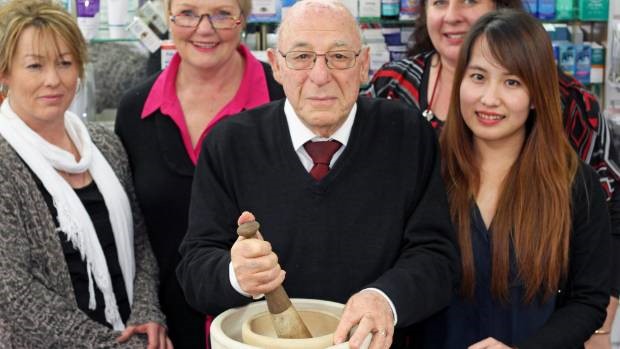 Photo: Hutt News
Photo: Hutt NewsWaterloo Pharmacy staff Michelle Jennings, Kerry Clout, retiring owner Maurice Payes, Catherine Ratahi, and Rozet Heng.
Our much-loved member, Maurice Payes, passed away this week and will be sadly missed by us all.
Joining Rotary on 3 October 1975, Maurice held the roles of Director, Community Service, Corporal, Programme Convenor, Bulletin Editor, Sergeant-at-Arms, Vice President (Membership), V-P Club Service in the seven years before becoming President in 1986-87. He then went onto be involved in the District, being part of the Rotary Foundation and Vocational Services committees, before becoming the District Governor’s Area Representative in 1990-91. In 1993-94 he was involved in the District Rotary Quiz and in 1994-94 was the District Chair of the Emergency Box Committee. He was also involved in the OZBO Days which ran for a few years and were a great money spinner. He was also awarded his PHF in this year.
Yesterday at Maurice's funeral, tributes were given by both President Richard (HERE) and Paul Giles (HERE).
The following is an article written by Jared Nicoll was published in the Hutt News on 3rd July 2015.
"When cannabis cured diarrhoea: A Waterloo Pharmacist reflects on 60 years"
"Once upon a time, we treated runny tummies with cannabis," says a retiring pharmacist.
Waterloo Pharmacy owner Maurice Payes, 77, shared some old-age secrets as he retired at the end of June. Payes worked at that very pharmacy along Trafalgar Square since leaving Hutt Valley High School to become a 16-year-old apprentice in 1955.
He studied at a pharmacy college in the city two mornings a week, sometimes two at night, for four years. The vast majority of Payes' time was spent mixing and cooking concoctions at the back of the drug store.
"I was lucky. My boss told me that the first day he started his apprenticeship in Gisborne, he was taken out the back and in the yard was a big old bath full of bottles to be washed. He vowed that when he had an apprentice, he'd never make them do that," Payes said.
"I've got an old prescription book here from 1951 or something like that. That was our computer system for the day; it was all written in hard copy. You had to write down each prescription as it came and note the person's name and address and mixture or cream or tablets. Some of the medicines cost three and six-pence."
He kept the old recipe book, a pill-presser and mortar bowls under the counter.
Doctors sometimes jotted down formulas with their prescriptions or referred pharmacists to the NZ formula book.
Over the years, mass-manufactured drugs such as antibiotics flourished; computerisation replaced notepads, and pharmacy students started paying more than $30,000 on four-year university degrees followed by a year of internship.
"They were notorious for terrible writing so you had to decipher that – if you were lucky. And they didn't like to be rung up and told there were any mistakes. I think some of them thought they were invincible in those days."
Payes became a business partner in 1961 and took over in 1969.
"Now people are taking much more. The doctors are prescribing more, but that's because it's now available. You can get medications now to help all sorts of things."
"Everything's got to be sealed properly, and dated and batch numbered – in those days there was no batch number. You'd add in a pound of zinc oxide, and it didn't tell you a batch number or use by date. But it all seemed to work. We used to make up vitamin emulsions and put it through a homogeniser to make it all gel properly."
He remembered when pharmacists used a form of cannabis plant in diarrhoea mixtures. "It used to come in liquid form. Not the same kind that was used for smoking, but it came from hemp. It worked quite well apparently."
Payes has no set plans for retirement, but would miss his colleagues and the Waterloo community. "I've had the same wife, the same house and the same job for 56 years. I decided it was time to change something so I chose the job."